Journalists from the Kherson Region were scattered by the war and occupation all over Ukraine and the world. But their majority strive to continue their professional activities so that the media, which have long been known to the residents of the Kherson Region and which have authority and readers, do not disappear. Of course, this is not easy to do when part of the region is occupied, and the territory of the Kherson Region liberated from the enemy is under constant attacks by the aggressor. Those media workers who remained in Kherson, under constant fire, continue to create news, reports, and interviews about the life of the city and region to document crimes of the enemy. Therefore, both relocated journalists and those currently at home need support. And they find it thanks to the National Union of Journalists of Ukraine (NUJU).
Participants in the meeting of the NUJU Board on January 25, 2024, one of the priority directions of the Union‘s activities, on the initiative of the NUJU President, Sergiy Tomilenko, approved assistance to Kherson regional organization of the NUJU and Kherson media workers who continue to actively cover the events taking place in their region. It is based on recommendations from well-known Kherson media personalities such as Oleh Baturin, Anzhela Slobodian, Maryna Savchenko, Anatolii Zhupyna, Valentyna Fedorchuk, Liubov Ruda, and Vita Kopenko.
The entire team of the NUJU Journalists’ Solidarity Centers (JSC) joined in to provide effective assistance to the NUJU journalists from Kherson. At the same time, the Ivano-Frankivsk JSC (coordinated by Viktoriya Plakhta) has been designated as the coordinating center.
During the specialized online working meeting of the NUJU, which took place on January 31, as well as during the online meeting of Kherson media workers called How To Enhance Media Attention To Kherson Issues, which took place on April 17, it was discussed how the journalists of the Kherson Region could carry out their creative activities, and about needs.
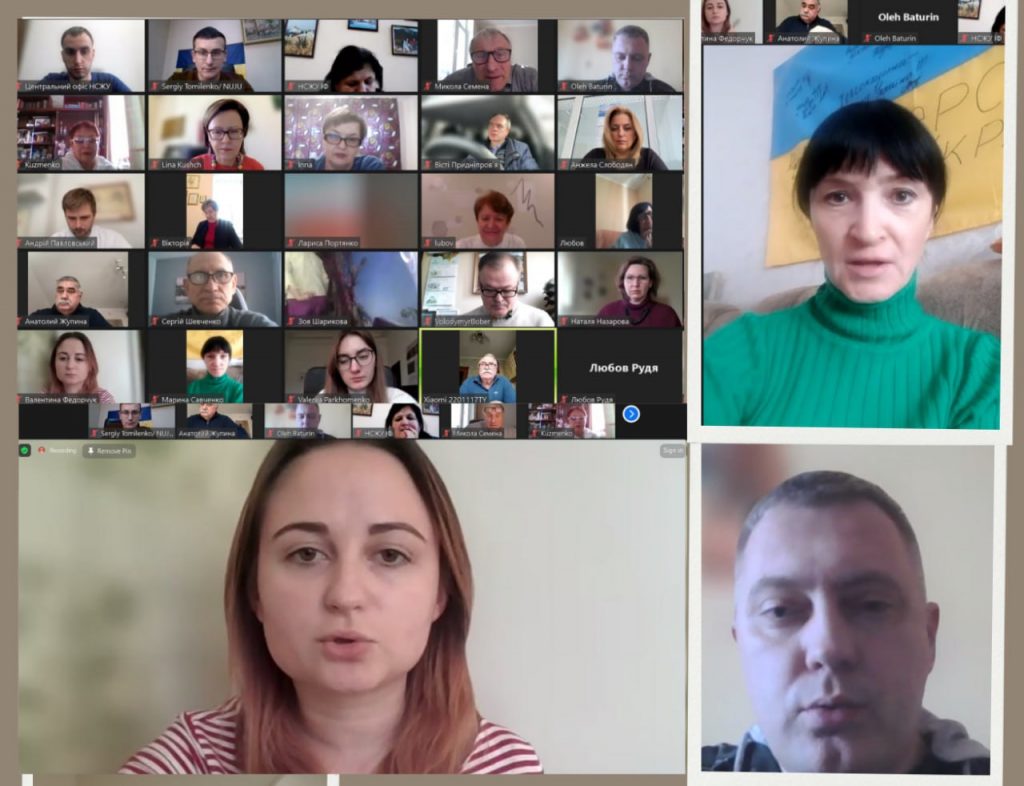
In particular, the material component, without which professional activity, in general, is impossible – power banks, bulletproof vests, materials, humanitarian aid, etc. Those are the priority needs pointed to by the media workers working under shelling in Kherson and those who have left for safer territories and continue to inform compatriots about events in the region.
The head of the Kherson regional organization of the NUJU, Valerii Dolyna, noted that before the beginning of the full-scale invasion of Ukraine by the russian federation, the regional organization had 338 members of the NUJU. However, 14 of them were excluded for collaborative activities. Many members of the Union left at the beginning of the full-scale war and the occupation. Eight Union members also serve in the ranks of the Armed Forces of Ukraine (AFU). Unfortunately, there are also losses – Anton Kolomiiets has been killed. Now, there are 300 Union members, half of whom are pensioners, the absolute majority of whom are now staying in Kherson. A number of media workers in the city continue to work. There are also many veterans of the Union who find themselves in a difficult situation and need support.
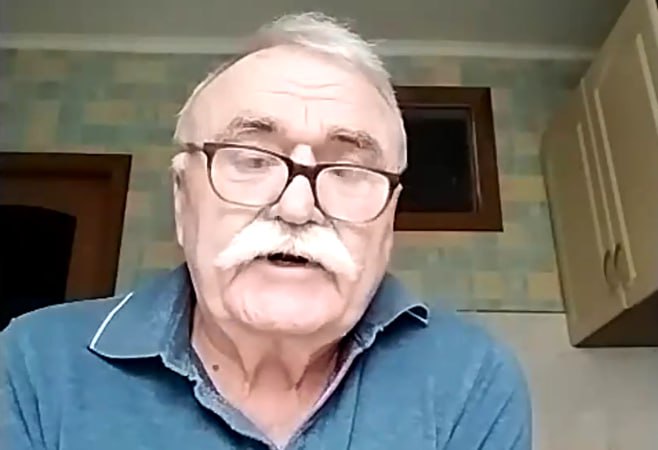
“It is very difficult to maintain contact with these people. But in response to those appeals that were received, we tried to provide assistance, in particular, to those who wanted to leave the occupied territory. The network of JSC plays a leading role in helping those in need. Our mission is to support each other, to thank for help, to survive and help others do it,” said Valerii Dolyna.
The President of the NUJU, Sergiy Tomilenko, drew attention to the fact that the priority areas of JSC are the physical safety of journalists, support for immigrant journalists who remain in the profession, and support for journalists who cover events related to the war in Ukraine.
“The Union has already provided various types of assistance to Kherson media workers. This is support in restoring the editions of the Novyi Den newspaper, material, technical, security assistance, etc. And the provision of assistance upon request will continue,” Sergiy Tomilenko noted.
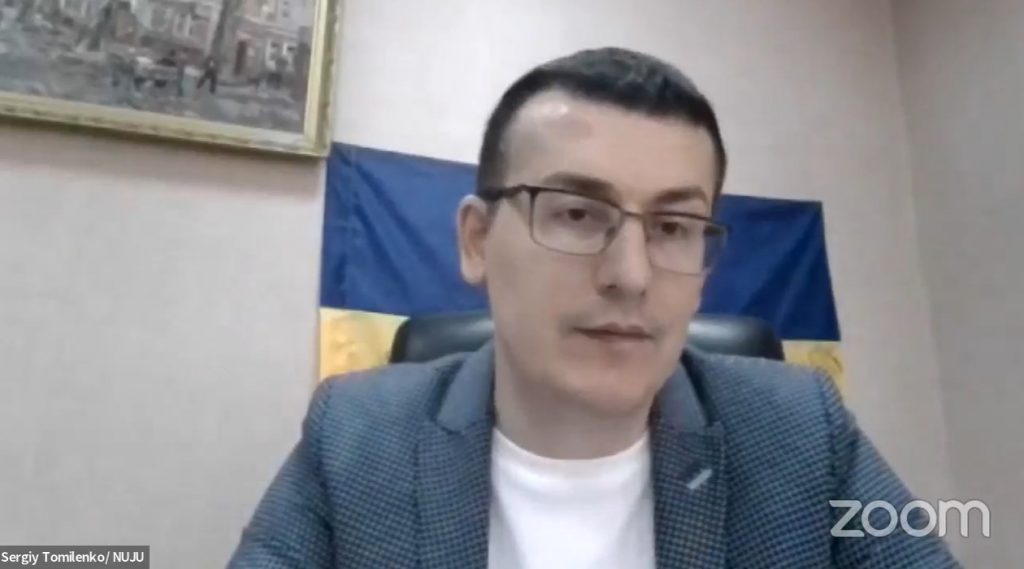
He also emphasized the importance of journalists documenting russia’s war crimes, and Kherson journalists are certainly doing a great job in this regard.
During the meeting, the journalists voiced all their requests and wishes, although not necessarily material ones. In particular, media workers who found refuge in other regions expressed the need for contact with local journalistic centers in order not to feel alone. After all, even moral support counts a lot. Maryna Savchenko, a media person, spoke about this, in particular.
Journalist Oleh Baturin emphasized the need for a kind of mini-grants, the funds of which could be used for a business trip to Kherson to prepare materials.
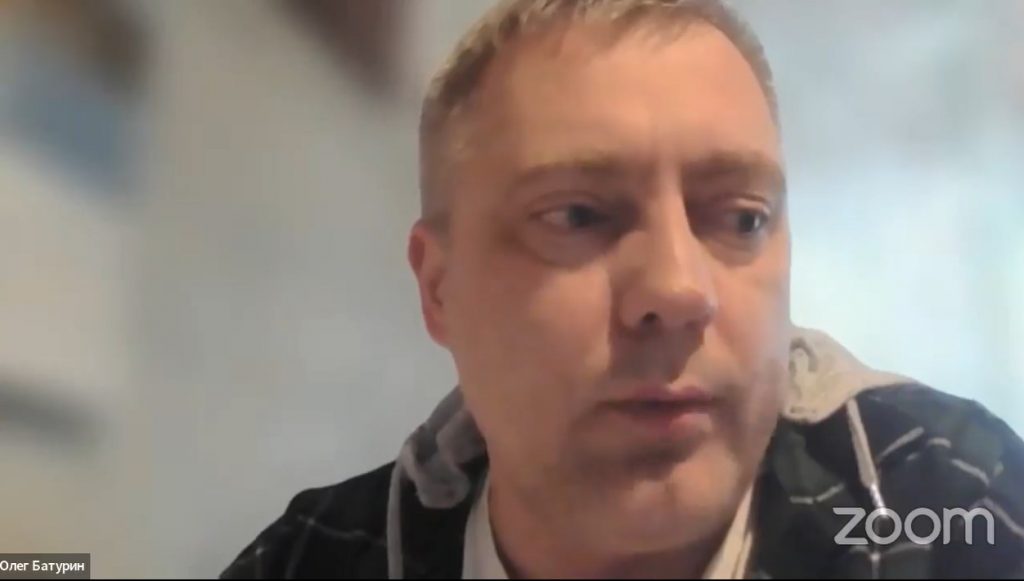
“Such business trips are usually not cheap, given the situation in the region, and it is not always possible to support the expenses with checks, because you need to contact, say, private drivers. However, this would make it possible to increase the amount of media content about Kherson and the Kherson Region in the media space,” Oleh Baturin noted.
Anatolii Zhupyna, the editor-in-chief of the Kherson regional newspaper, Novyi Den, which the NUJU helped to restore printing with the support of international partners, also drew attention to the difficulties with traveling to Kherson and in the region, to problems, the solution of which is important for the newsroom, and to free events not only for journalists but also for the heroes of their materials.
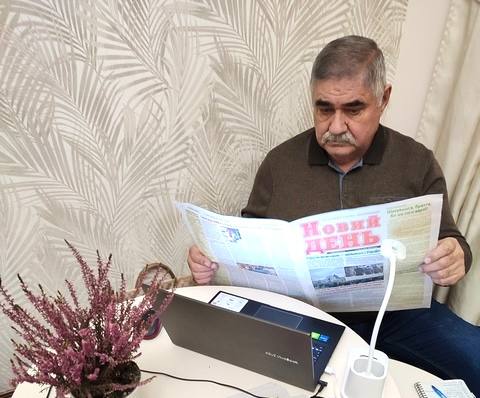
“Sometimes, we cannot name not only the last names of the authors, but also the names of the main characters of a publication, so as not to harm them,” noted Anatolii Zhupyna.
He also proposed creating a support fund for journalists with the help of the state in order to help the media survive because one cannot rely only on international partners.
Kherson media people asked to hold training sessions for them on writing grants. Because not everyone is well-versed in this issue, and the meantime, grant proposals are a good opportunity for media survival that should not be missed.
The First Secretary of the NUJU, Lina Kushch, suggested that, for more effective assistance to media persons, the organization of types of assistance should be differentiated: part of the support, for example, provision of humanitarian aid, can be undertaken by the NUJU regional organizations, and technical and other assistance by the NUJU head office and the network of Journalists’ Solidarity Centers.
Viktoriya Plakhta, the coordinator of the Ivano-Frankivsk JSC of the NUJU, reported that currently nine media workers from the Kherson Region are registered in the JSC. However, any journalist from the Kherson Region who applies and who reasonably needs help can count on support.
“Together with Valerii Dolyna, we have already worked out the list of necessary assistance to Kherson journalists; the corresponding lists have been approved, and, if possible, they will receive support,” she said.
Thanks to the NUJU, ten Kherson journalists received financial assistance within the framework of the Partnership For Victory project, which is implemented by the Ivano-Frankivsk JSC of the NUJU.
“Through our Journalists’ Solidarity Center, we maintain constant contact with colleagues – by phone or Skype. By communicating, we know how their families live, what they need, and what problems they face. In close cooperation with the NUJU and thanks to its strong support, we are trying to solve and help together,” says the JSC coordinator, Viktoriya Plakhta.
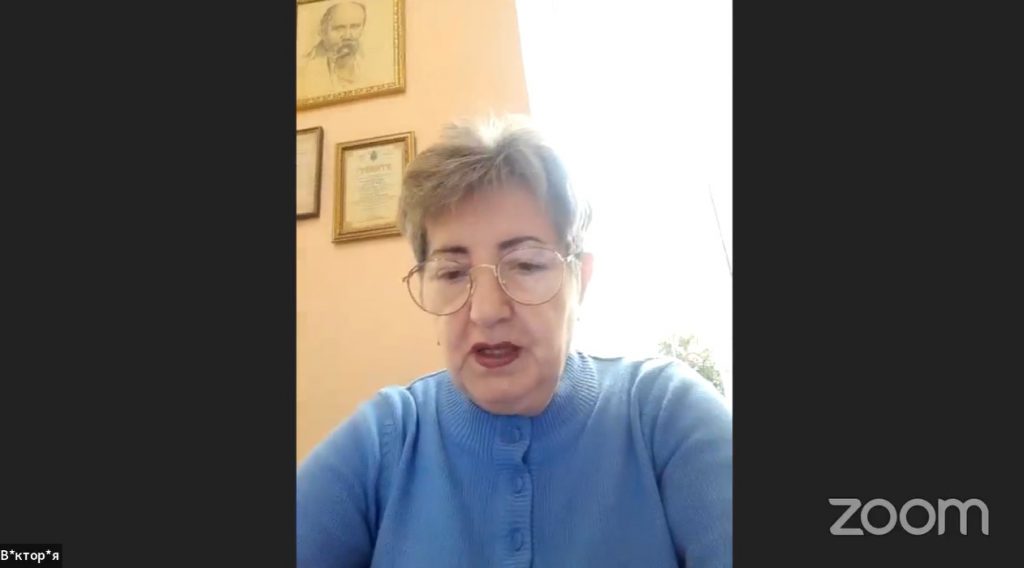
Kherson journalists admit that such support from their colleagues during the war is important and necessary for them. They gratefully say: “The most important thing is that we were not forgotten.”
“I sincerely thank the NUJU in general and the Ivano-Frankivsk JSC for the financial assistance. I am forced to stay outside my home. My city was under occupation, and now, it is a war zone. I lost almost everything if not everything. So, any help is invaluable to me. I am convinced that we will overcome all difficulties together,” says Maksym Karakoz, a journalist for the National Network of Hyperlocal Media, Rayon.in.ua.
His colleague Oleksii Kosenko said that thanks to the financial assistance received from the NUJU, he was able to solve certain problems.
“I had to move to another city, where I currently continue to work in journalism and write about the situation in the temporarily occupied part of the Kherson Region. Any kind of support is important to me now. I am grateful for the financial assistance of the Union because it was able to solve problematic issues such as paying the rent and undergoing the necessary treatment. I also thank my colleagues from the Ivano-Frankivsk JSC for their concern,” says Oleksii.
“In this difficult time, it is important to unite and support each other. It is thanks to the solidarity of our journalistic community that we have the opportunity to continue to tell the whole world about the events taking place in Ukraine, in its hottest spots, the history of indomitability, and the restoration of our native Kherson Region. I am grateful to the Union for its support. Because together we are a real force!” says Olena Pimienova, the founder and author of the informational online publication City Of The Sun [Misto Sontsia].
Help was also invaluable for those media workers who remained in Kherson and continue to hold the information front despite all the dangers characteristic of a front-line city.
“Help from the NUJU was very important for me because almost the entire year when Kherson was occupied, I did not work, so debts for the utility company accumulated. Now, there was also a need to take care of my health. So, every penny counts. I am grateful to the NUJU and international partners for their help,” said Roman Tsariov, a TV operator of the Kherson Public TV channel.
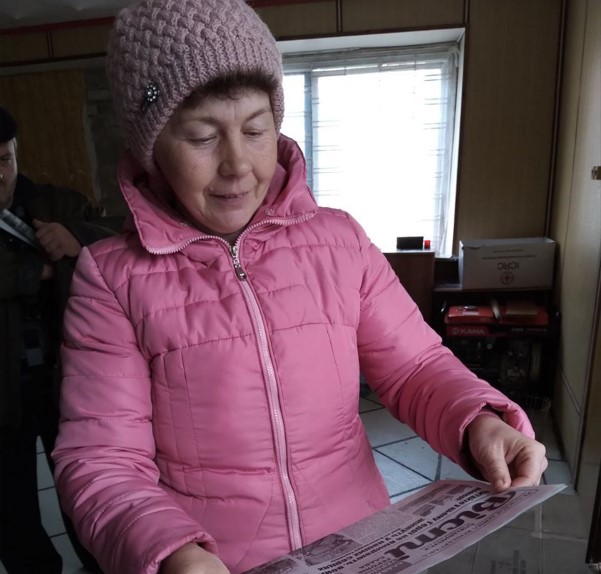
Iryna Kosharska, the editor of the Visti newspaper in de-occupied Novovorontsovka, asked for financial assistance to pay for the Internet and website maintenance. Almost a year ago, after a long forced break due to the occupation of Beryslav District, a small editorial team resumed printing the newspaper. And now, the newsroom makes every effort to ensure that readers from the villages and towns of the five communities learn about current local news and receive useful and, most importantly, verified information.
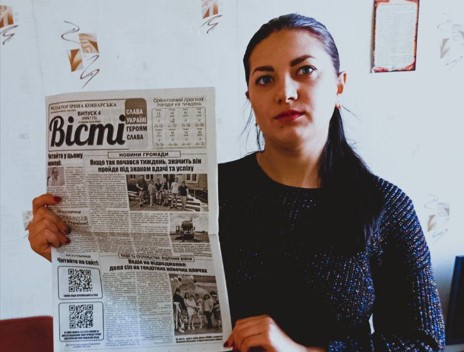
“The restoration of the newspaper, which is almost 90 years old, turned out to be a big challenge. After all, we had to start by looking for a new printing house, alternative methods of delivery and distribution, and most importantly – we did not have the necessary financial resources. The NUJU came to the rescue and the first special issue of the now monthly Visti newspaper after the occupation was published in March 2023. Now, we are preparing the next 15th issue for printing. I would like to sincerely thank the NUJU and international partners for their invaluable support to Ukrainian media people, in particular to us, small local media, because for most of our compatriots, our newspapers are the only source of reliable information. In addition, such help is very important because, despite all the challenges of war, we can do what we love to benefit people. I call on everyone to support Ukrainian journalists. After all, our work is not just a vocation, but the struggle on the information front,” Iryna Kosharska said.
Aliyona Movchan, a journalist, has also remained in the profession and is now engaged in a multifaceted journalistic activity. She is a news supervisor at the Suspilne.Kherson TV channel and the head of the literary and dramaturgical department of the Kherson Music and Drama Theater, whose duties include covering the work of the theater in the media and social networks. She also wrote and published the book called Occupation.
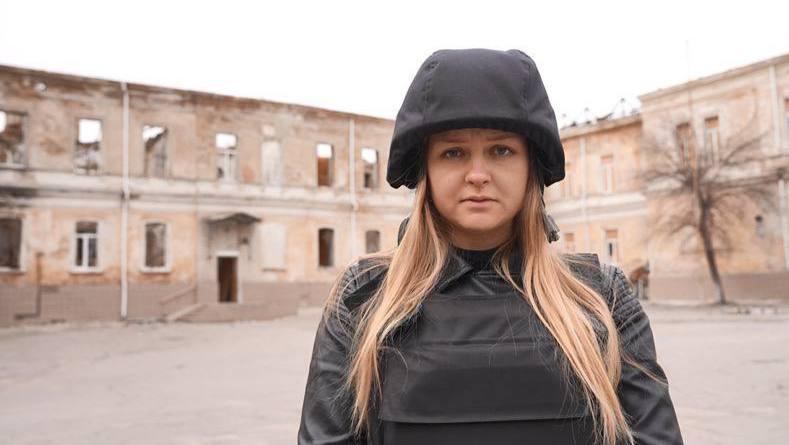
“I work in Kherson, in a city on the front line, a city under constant shelling. The left bank is less than three kilometers away. I make a lot of stories – they are stories of Kherson people, just incredible people. A book should be written about each of them, and stories and programs should be created because they survived the occupation and remain in the city, living, working, and rebuilding their lives. Kherson is a very inspiring city, although we are all in constant danger. Cafes are opened, concerts are organized, and behind all this are people, our incredible defenders, incredible firefighters, rescuers, doctors, everyone. I want to thank the NUJU for its support and help. It is very important when you do something and get a return. The help provided by the Union for journalists is very important because it is also the return that motivates them to work further. I want to express my sincere gratitude to international partners and everyone who supports us. You give people a little hope; it is very valuable and important,” she said.
However, the journalists themselves strive to support each other in all possible ways. And these are not only warm words and sincere emotions. For example, the well-known TV presenter Tetiana Vysotska organized a fund-raising campaign for a Kherson journalist who lives in the occupied territory. Of course, it was not easy because when announcing the campaign on social networks, Tetiana could not name her colleague or their whereabouts for reasons of safety.
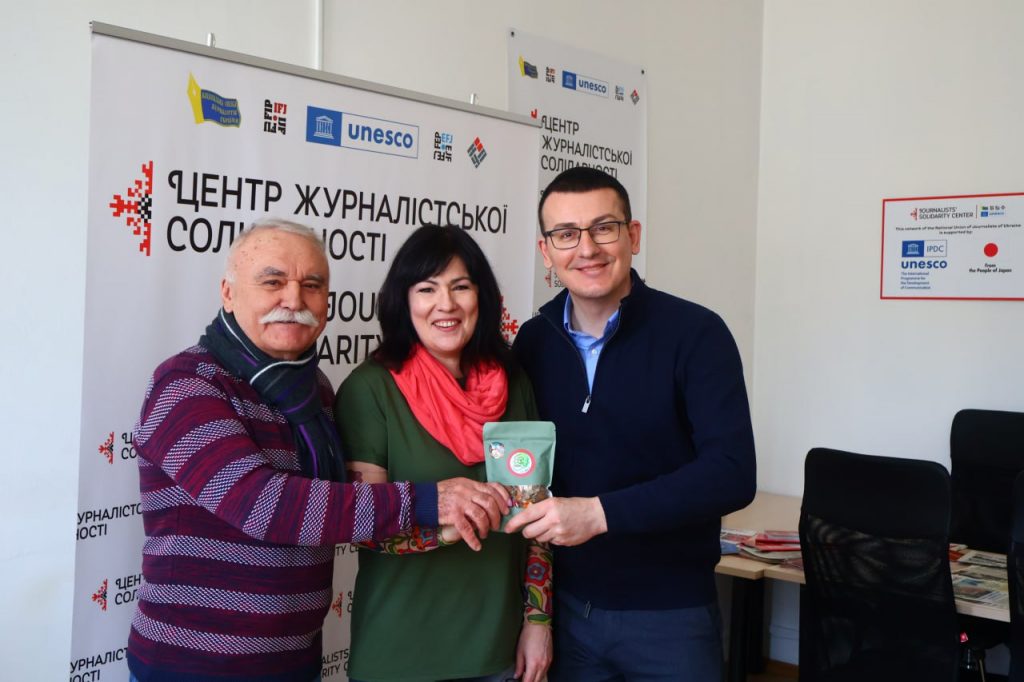
Recently, the NUJU fulfilled the dream of Kherson media workers about financial facilitation of work trips around the region, offering, at the request of Oleh Baturin, ten travel grants for the travel of Kherson journalists to the liberated settlements of the Kherson Region. These grants will be issued based on the results of the currently announced competition. In particular, five grants will be awarded to journalists who were relocated due to hostilities to other regions of Ukraine but continue to write about their native land. And five more grants are intended for media workers working in the region. The grants will be issued for the preparation of materials in various formats and genres – interviews, reports, journalistic investigations, etc. A travel grant can be used for any expenses related to the preparation of materials: train tickets, bus, taxi, BlaBlaCar, gasoline, LPG, diesel fuel, car rental, hotel or apartment rental, and daily food allowance. However, this support does not include fees for materials produced.
The initiative of the NUJU and international partners to issue such travel grants was presented during the online meeting of Kherson media workers called How To Enhance Media Attention To Kherson Issues, which was held on April 17 at the initiative of the NUJU, which gathered more than 30 participants, including journalists, editors and media managers who work and cover life in the Kherson Region near the front.
The meeting participants also shared their opinions on the most pressing problems in the region, which should be paid attention to in the media.
“We are proud of the work of Kherson journalists and want it to be visible in both national and international media. It is very important for us to support worthy Ukrainian journalists who pass the tests with dignity. At the moment, there are many colleagues from Kherson, albeit a permanent danger, who continue to live in the Kherson Region or go there on business trips. Our priority is to support them and all journalists who remain in the profession,” Sergiy Tomilenko stressed.
The President of the NUJU also talked about the initiatives and pilot projects implemented by the Union to support colleagues from Kherson.
Kherson media people, having supported the initiative to provide travel grants, for which they have already started to apply by filling out the appropriate form, drew attention to the problems that prevent them from working effectively and providing readers, listeners, and viewers with objective and true information.
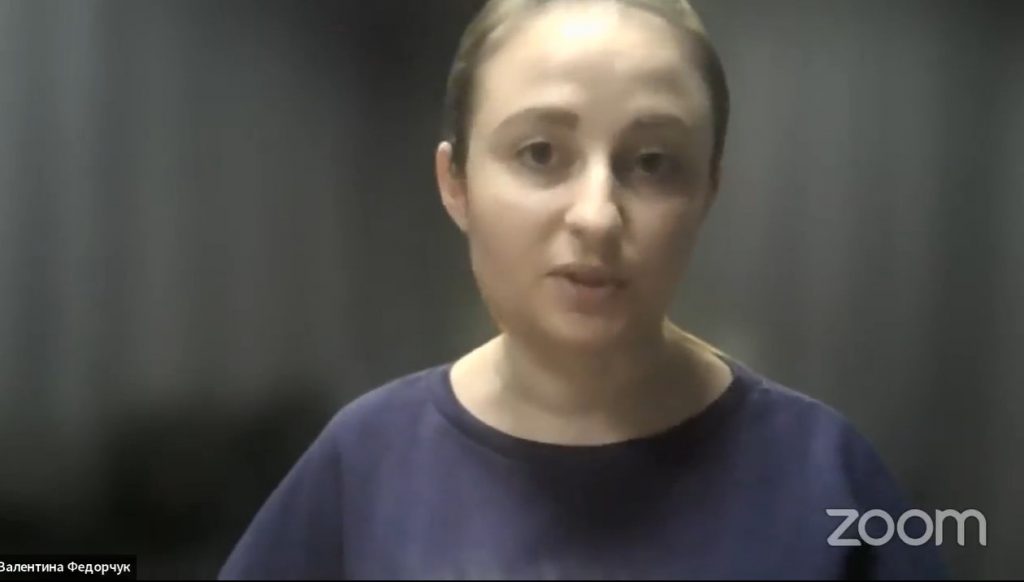
One of them is the fact that it is difficult to get to a number of territories of the Kherson Region. More than 160 leading front-line reporters, media, and journalistic organizations signed a statement demanding to replace the head of the joint coordination press center of the Defense Forces of Southern Ukraine, Nataliya Humeniuk, because of her approaches to media workers, which are based on total prohibitions.
Many Kherson media workers drew attention to this problem during the meeting.
“There are such limits, such rules are established, according to which it is impossible to go to communities and prepare materials not only on military topics but also on civilian ones – about the return of communities to life, about reconstruction, about russian war crimes, etc. It is also practically impossible to meet with representatives of civil authorities. We have repeatedly faced the fact that we are not physically allowed to enter a number of territories of the region, even those where we could go,” said Oleh Baturin.
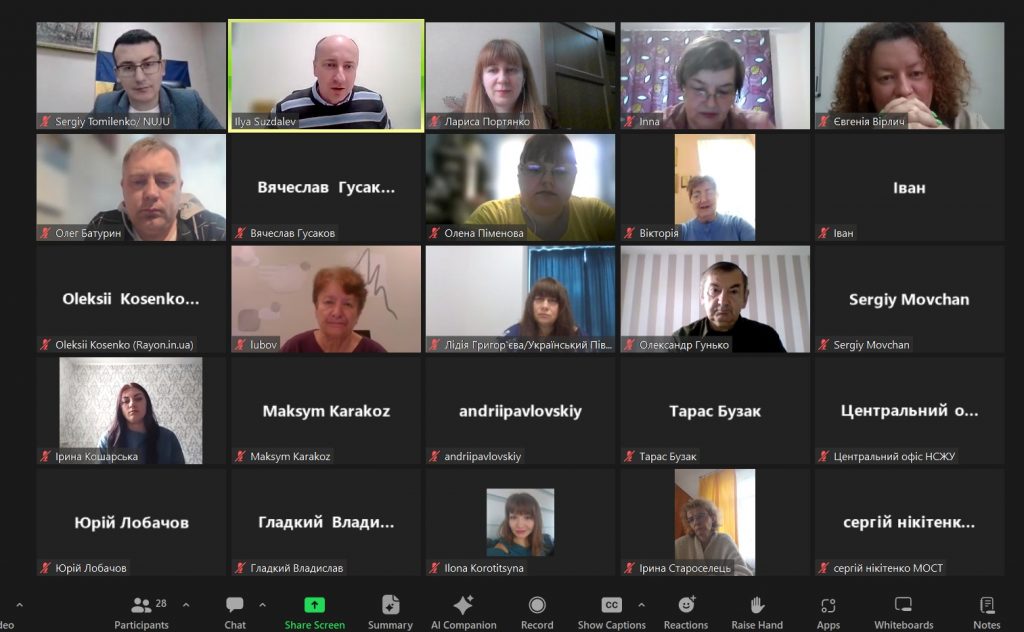
In general, this problem gained such a resonance that two days after the meeting, the General Staff of the AFU reacted to it, informing about the dismissal of Nataliya Humeniuk and the selection of a specialist who will soon become the “voice” of the Southern Defense Forces is underway.
However, the issue of support and development of local media as a component of information security, including in the Kherson Region, should be complex and require increased attention. Then, the presence of Kherson topics in the information space will become more noticeable.
“Unfortunately, we do not see due attention to the importance of journalists on the ground. But we are lobbying for this idea. Also, we call on all international platforms that all discussions and debates about the reconstruction of Ukraine about the involvement of international programs should also include a clause on supporting the development of local media. After all, it is regional media that contribute to the fact that public control over the use of external resources will take place, anti-corruption component will be provided, etc. This resource could also help journalists in the regions and ensure the transparency and openness of the implementation of all projects,” Sergiy Tomilenko emphasized.
How can one find NUJU’s Journalists’ Solidarity Centers?
The centers are always open on weekdays. But it is better to call the coordinators in advance to agree on a convenient time for you. The JSCs are located at the following addresses:
- Kyiv – 27A Khreshchatyk Street, tel.: 050 680 5204 (coordinator Illia Suzdaliev);
- United Western Ukrainian JSC – Lviv – 5 Solomiyi Krushelnytskoyi Street, 2nd floor; tel.: 097 907 9702 (coordinator Nataliya Voitovych); Chernivtsi – 96 Nezalezhnosti Avenue, tel.: 068 286 3706 (coordinator Volodymyr Bober);
- Ivano-Frankivsk – 25 Sichovykh Striltsiv Street; tel.: 066 677 0726 (coordinator Viktoriya Plakhta);
- Zaporizhzhia – 152 Sobornyi Avenue, tel.: 096 277 5352 (coordinators Nataliya Kuzmenko and Valentyna Manzhura);
- Dnipro – 8 Starokozatska Street; tel.: 050 919 8479 (coordinator Nataliya Nazarova);
- Kharkiv – tel.: 095 421 5477 (coordinator Hanna Chernenko).
ABOUT JSC
The Journalists’ Solidarity Centers is an initiative of the NUJU implemented with the support of the International and European Federations of Journalists and UNESCO. The initiative is designated to help media representatives working in Ukraine during the war. The Centers operate in Kyiv, Lviv, Ivano-Frankivsk, Chernivtsi, Zaporizhzhia, and Dnipro and provide journalists with organizational, technical, legal, psychological, and other types of assistance.
ABOUT UNESCO
UNESCO is the United Nations Educational, Scientific, and Cultural Organization. It contributes to peace and security by promoting international cooperation in education, sciences, culture, communication, and information. UNESCO promotes knowledge sharing and the free flow of ideas to accelerate mutual understanding. It is the coordinator of the UN Action Plan on the Safety of Journalists and the Issue of Impunity, which aims to create a free and safe environment for journalists and media workers, thus strengthening peace, democracy, and sustainable development worldwide. UNESCO is working closely with its partner organizations in Ukraine to provide support to journalists on the ground.
The designations employed and the presentation of material throughout this digest do not imply the expression of any opinion whatsoever on the part of UNESCO concerning the legal status of any country, territory, city, or area or its authorities or concerning the delimitation of its frontiers or boundaries.
The authors are responsible for the choice and the presentation of the facts contained in this digest and for the opinions expressed therein, which are not necessarily those of UNESCO and do not commit to the organization.
NUJU Information Service

 THE NATIONAL UNION OF
JOURNALISTS OF UKRAINE
THE NATIONAL UNION OF
JOURNALISTS OF UKRAINE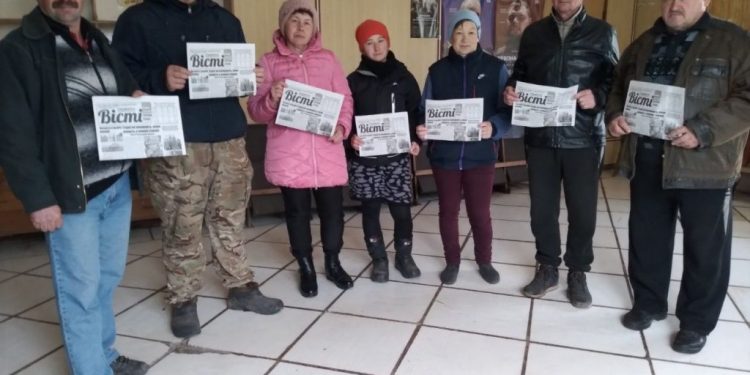
















Discussion about this post